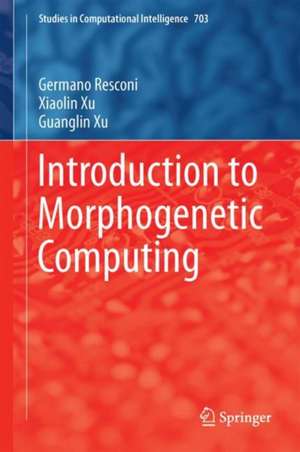Introduction to Morphogenetic Computing: Studies in Computational Intelligence, cartea 703
Autor Germano Resconi, Xiaolin Xu, Guanglin Xuen Limba Engleză Hardback – 19 mai 2017
| Toate formatele și edițiile | Preț | Express |
|---|---|---|
| Paperback (1) | 640.05 lei 6-8 săpt. | |
| Springer International Publishing – 28 iul 2018 | 640.05 lei 6-8 săpt. | |
| Hardback (1) | 646.12 lei 6-8 săpt. | |
| Springer International Publishing – 19 mai 2017 | 646.12 lei 6-8 săpt. |
Din seria Studies in Computational Intelligence
- 20%
 Preț: 449.37 lei
Preț: 449.37 lei - 20%
 Preț: 1158.26 lei
Preț: 1158.26 lei - 20%
 Preț: 986.66 lei
Preț: 986.66 lei - 20%
 Preț: 1452.76 lei
Preț: 1452.76 lei - 20%
 Preț: 168.78 lei
Preț: 168.78 lei - 20%
 Preț: 1291.10 lei
Preț: 1291.10 lei - 18%
 Preț: 1112.30 lei
Preț: 1112.30 lei - 20%
 Preț: 565.39 lei
Preț: 565.39 lei - 20%
 Preț: 649.28 lei
Preț: 649.28 lei - 20%
 Preț: 1047.73 lei
Preț: 1047.73 lei - 20%
 Preț: 1578.96 lei
Preț: 1578.96 lei - 20%
 Preț: 643.50 lei
Preț: 643.50 lei - 20%
 Preț: 657.49 lei
Preț: 657.49 lei - 20%
 Preț: 993.28 lei
Preț: 993.28 lei - 20%
 Preț: 990.80 lei
Preț: 990.80 lei - 20%
 Preț: 989.96 lei
Preț: 989.96 lei - 20%
 Preț: 1165.69 lei
Preț: 1165.69 lei - 20%
 Preț: 1444.52 lei
Preț: 1444.52 lei - 20%
 Preț: 1041.96 lei
Preț: 1041.96 lei - 20%
 Preț: 1047.73 lei
Preț: 1047.73 lei - 20%
 Preț: 1046.06 lei
Preț: 1046.06 lei - 18%
 Preț: 2500.50 lei
Preț: 2500.50 lei - 20%
 Preț: 989.13 lei
Preț: 989.13 lei - 20%
 Preț: 1165.69 lei
Preț: 1165.69 lei - 20%
 Preț: 1164.05 lei
Preț: 1164.05 lei - 20%
 Preț: 1042.79 lei
Preț: 1042.79 lei - 20%
 Preț: 1460.19 lei
Preț: 1460.19 lei - 18%
 Preț: 1403.52 lei
Preț: 1403.52 lei - 18%
 Preț: 1124.92 lei
Preț: 1124.92 lei - 20%
 Preț: 1039.47 lei
Preț: 1039.47 lei - 20%
 Preț: 1008.11 lei
Preț: 1008.11 lei - 20%
 Preț: 1045.25 lei
Preț: 1045.25 lei - 20%
 Preț: 1275.42 lei
Preț: 1275.42 lei - 20%
 Preț: 1040.32 lei
Preț: 1040.32 lei - 20%
 Preț: 988.32 lei
Preț: 988.32 lei - 20%
 Preț: 1169.79 lei
Preț: 1169.79 lei - 20%
 Preț: 1162.37 lei
Preț: 1162.37 lei - 20%
 Preț: 1059.26 lei
Preț: 1059.26 lei - 20%
 Preț: 1164.05 lei
Preț: 1164.05 lei - 20%
 Preț: 1166.52 lei
Preț: 1166.52 lei - 20%
 Preț: 1459.38 lei
Preț: 1459.38 lei - 18%
 Preț: 1005.74 lei
Preț: 1005.74 lei - 20%
 Preț: 997.38 lei
Preț: 997.38 lei - 20%
 Preț: 1055.94 lei
Preț: 1055.94 lei - 20%
 Preț: 1284.47 lei
Preț: 1284.47 lei - 20%
 Preț: 994.08 lei
Preț: 994.08 lei - 20%
 Preț: 1048.72 lei
Preț: 1048.72 lei - 20%
 Preț: 1066.02 lei
Preț: 1066.02 lei - 20%
 Preț: 943.78 lei
Preț: 943.78 lei - 20%
 Preț: 1173.10 lei
Preț: 1173.10 lei
Preț: 646.12 lei
Preț vechi: 807.65 lei
-20% Nou
Puncte Express: 969
Preț estimativ în valută:
123.64€ • 132.21$ • 103.08£
123.64€ • 132.21$ • 103.08£
Carte tipărită la comandă
Livrare economică 17 aprilie-01 mai
Preluare comenzi: 021 569.72.76
Specificații
ISBN-13: 9783319576145
ISBN-10: 3319576143
Pagini: 172
Ilustrații: IX, 172 p. 145 illus.
Dimensiuni: 155 x 235 x 13 mm
Greutate: 0.44 kg
Ediția:1st ed. 2017
Editura: Springer International Publishing
Colecția Springer
Seria Studies in Computational Intelligence
Locul publicării:Cham, Switzerland
ISBN-10: 3319576143
Pagini: 172
Ilustrații: IX, 172 p. 145 illus.
Dimensiuni: 155 x 235 x 13 mm
Greutate: 0.44 kg
Ediția:1st ed. 2017
Editura: Springer International Publishing
Colecția Springer
Seria Studies in Computational Intelligence
Locul publicării:Cham, Switzerland
Cuprins
Database and Graph Theory [16].- Crossover and Permutation.- Similarity Between Graphs in Database by Permutations.- Morphogenetic and Morpheme Network to Structured Worlds.- Formal Description and References in Graph Theory.
Recenzii
“The volume offers an interesting perspective at the diversity of topics, which is well reflected in the content of the successive chapters including topics such as graph theory with their formal description and references, logic of conflicts, morphogenetic computing in genetic algorithms, and neural morphogenetic computing. … the book could appeal to those who would like to gain an introductory exposure to morphogenetic computing and consider applying these ideas to their own research problems and applications.” (Witold Pedrycz, zbMATH 1390.68009, 2018)
Textul de pe ultima copertă
This book offers a concise introduction to morphogenetic computing, showing that its use makes global and local relations, defects in crystal non-Euclidean geometry databases with source and sink, genetic algorithms, and neural networks more stable and efficient. It also presents applications to database, language, nanotechnology with defects, biological genetic structure, electrical circuit, and big data structure. In Turing machines, input and output states form a system – when the system is in one state, the input is transformed into output. This computation is always deterministic and without any possible contradiction or defects. In natural computation there are defects and contradictions that have to be solved to give a coherent and effective computation. The new computation generates the morphology of the system that assumes different forms in time. Genetic process is the prototype of the morphogenetic computing. At the Boolean logic truth value, we substitute a set of truth(active sets) values with possible contradictions. The value of a proposition is a set of true and false values. The aim of morphogenetic computing is to use and solve the contradictions in order to transform systems to allow classical computation.
Caracteristici
Presents a concise introduction to morphogenetic computing Introduces a fundamental new approach to computation by which you can move from uncertainty, inconsistency, and imprecision to a more logical stable and consistent situation Shows that global and local relations, defects in crystal non-Euclidean geometry databases with source and sink, genetic algorithms, and neural networks all become more stable and efficient when using morphogenetic computing Includes supplementary material: sn.pub/extras Includes supplementary material: sn.pub/extras













